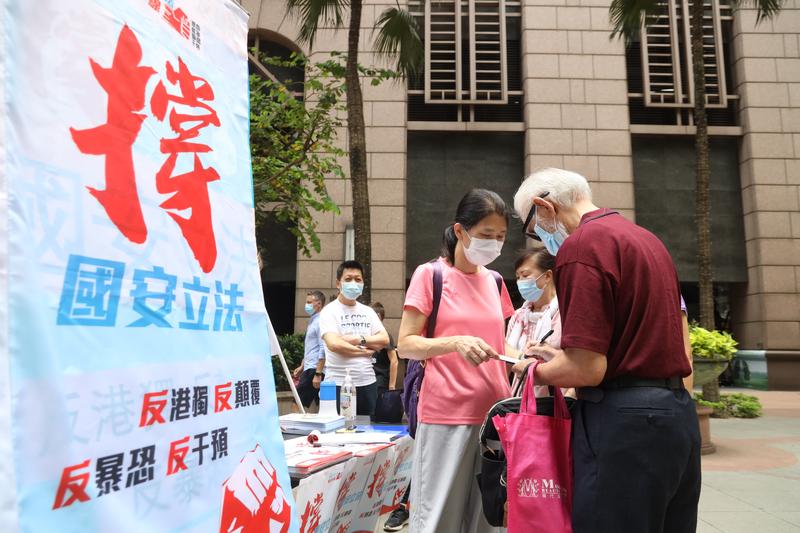 An elderly Hong Kong resident signs a petition in support of the country’s top legislature enacting a national security law for the special administrative region on Sunday in Central. The proposed legislation aims to outlaw acts of secession, subversion, terrorism and external intervention. (PHOTO / CHINA DAILY)
An elderly Hong Kong resident signs a petition in support of the country’s top legislature enacting a national security law for the special administrative region on Sunday in Central. The proposed legislation aims to outlaw acts of secession, subversion, terrorism and external intervention. (PHOTO / CHINA DAILY)
Hong Kong residents voiced their support on Sunday for the national security legislation put forward by China’s top legislature, hoping it can restore peace in the city and free it from the street violence that put businesses and people’s livelihoods in great peril.
Meanwhile, an online petition in support of the legislation launched on Saturday in Hong Kong has collected over 90,000 signatures by 6 pm.
Pang Shun-mee, a 77-year-old former civil servant who was among the signatories, said “heavy penalties are the right medicine to treat a chaotic society”.
He said Hong Kong needs such a resolution as the city has been suffering from violence and chaos triggered by “traitors” and a small group of rioters who have lost their sense of national identity.
Pang said they should be severely punished by the forthcoming national security law.
“These people are trying to deprive other people of their rights for their own political gains and sacrifice other people’s freedom for their own freedom,” he said.
A European banker based in Hong Kong, who asked to remain anonymous, dismissed speculation that a national security law would be a blow to Hong Kong’s status as a financial center.
“If the law contributes to the safety and security of the city, I personally would welcome it,” he said. “The financial sector always prefers a stable environment.”
He said the violence and instability caused by the protests were the main reasons many banks had left the city since June.
The banker said he was not worried about the business environment in Hong Kong even if the legislation causes short-term market volatility, as some who oppose the legislation have predicted.
Banks that leave will come back, in the same way that some banks that left before 1997, when the city was returned to China, moved back to Hong Kong when they realized the only change was broader opportunities, he said. In fact, more banks had come to the city for business since that year, he said.
The signature campaign, launched both online and through 133 street booths across the city, was initiated by a coalition consisting of over 2,000 political, social, business and education leaders in Hong Kong.
Wendy Ma, a local resident in her 30s, was a volunteer at one of the street booths in North Point, on Hong Kong Island.
Ma, a wedding planner, was a victim of the protests that began in June. Orders were slashed and pre-booked events had to be canceled as popular wedding banquet venues in Tsim Sha Tsui and Causeway Bay, the city’s major commercial districts, were often targets of the radicals.
Ma said the legislation would effectively deter the opposition camp and those who condone the violence that has wreaked havoc in Hong Kong.
During a ceremony to promote the campaign on Sunday morning, one of the conveners, pro-establishment Hong Kong legislator Starry Lee Wai-king, stressed that the National People’s Congress’ proposal to introduce the national security legislation was necessary to address legal loopholes and ensure the well-being of the people.
Founders of the campaign include Tam Yiu-chung, a Hong Kong member of the NPC’s Standing Committee; Kennedy Wong Ying-ho, a member of the Chinese People’s Political Consultative Conference National Committee; NPC deputies Stanley Ng Chau-pei and Brave Chan Yung; and Hong Kong legislator Regina Ip Lau Suk-yee.


